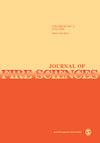羊毛/纤维素和羊毛/合成纤维混合物的易燃性测试:垂直火焰蔓延和热释放结果
IF 1.9
4区 工程技术
Q2 ENGINEERING, MULTIDISCIPLINARY
引用次数: 4
摘要
羊毛是一种天然纤维,其热释放/可燃性比一些合成织物低,但当织物中存在棉、亚麻和尼龙等其他纤维时,羊毛的热释放尚未得到充分研究。本文报道了六种市售天然色织物的热释放和垂直火焰传播。这包括100%羊毛、80%羊毛/20%尼龙、70%羊毛/30%亚麻、45%羊毛/55%棉和40%羊毛/38%棉/12%尼龙/10%金属线织物。通过锥形量热法(ASTM E1354)作为样品安装方法的函数,通过微尺度燃烧量热仪(ASTM D7309)测量热释放,并通过ASTM D6413测量火焰蔓延。使用的隔热背衬类型对锥形量热计的结果有很大影响,织物类型在垂直火焰蔓延和微型燃烧量热计测试中确实显示出一些影响。本文章由计算机程序翻译,如有差异,请以英文原文为准。
Flammability testing of wool/cellulosic and wool/synthetic fiber blends: Vertical flame spread and heat release results
Wool is a natural fiber with lower heat release/flammability than some synthetic fabrics, but it has not been well studied for its heat release when other fibers such as cotton, linen, and nylon are present in the woven fabric. In this article, the heat release and vertical flame spread of six commercially available natural color fabrics is reported. This includes 100% wool, 80% wool/20% nylon, 70% wool/30% linen, 45% wool/55% cotton, and 40% wool/38% cotton/12% nylon/10% metallic thread fabric. Heat release was measured through cone calorimetry (ASTM E1354) as a function of the sample mounting method, through microscale combustion calorimetry (ASTM D7309), and flame spread was measured by ASTM D6413. The type of insulated backing used greatly affected the cone calorimeter results, and fabric types did show some effects in vertical flame spread and microscale combustion calorimeter testing.
求助全文
通过发布文献求助,成功后即可免费获取论文全文。
去求助
来源期刊

Journal of Fire Sciences
工程技术-材料科学:综合
CiteScore
4.00
自引率
0.00%
发文量
14
审稿时长
2.5 months
期刊介绍:
The Journal of Fire Sciences is a leading journal for the reporting of significant fundamental and applied research that brings understanding of fire chemistry and fire physics to fire safety. Its content is aimed toward the prevention and mitigation of the adverse effects of fires involving combustible materials, as well as development of new tools to better address fire safety needs. The Journal of Fire Sciences covers experimental or theoretical studies of fire initiation and growth, flame retardant chemistry, fire physics relative to material behavior, fire containment, fire threat to people and the environment and fire safety engineering. This journal is a member of the Committee on Publication Ethics (COPE).
 求助内容:
求助内容: 应助结果提醒方式:
应助结果提醒方式:


